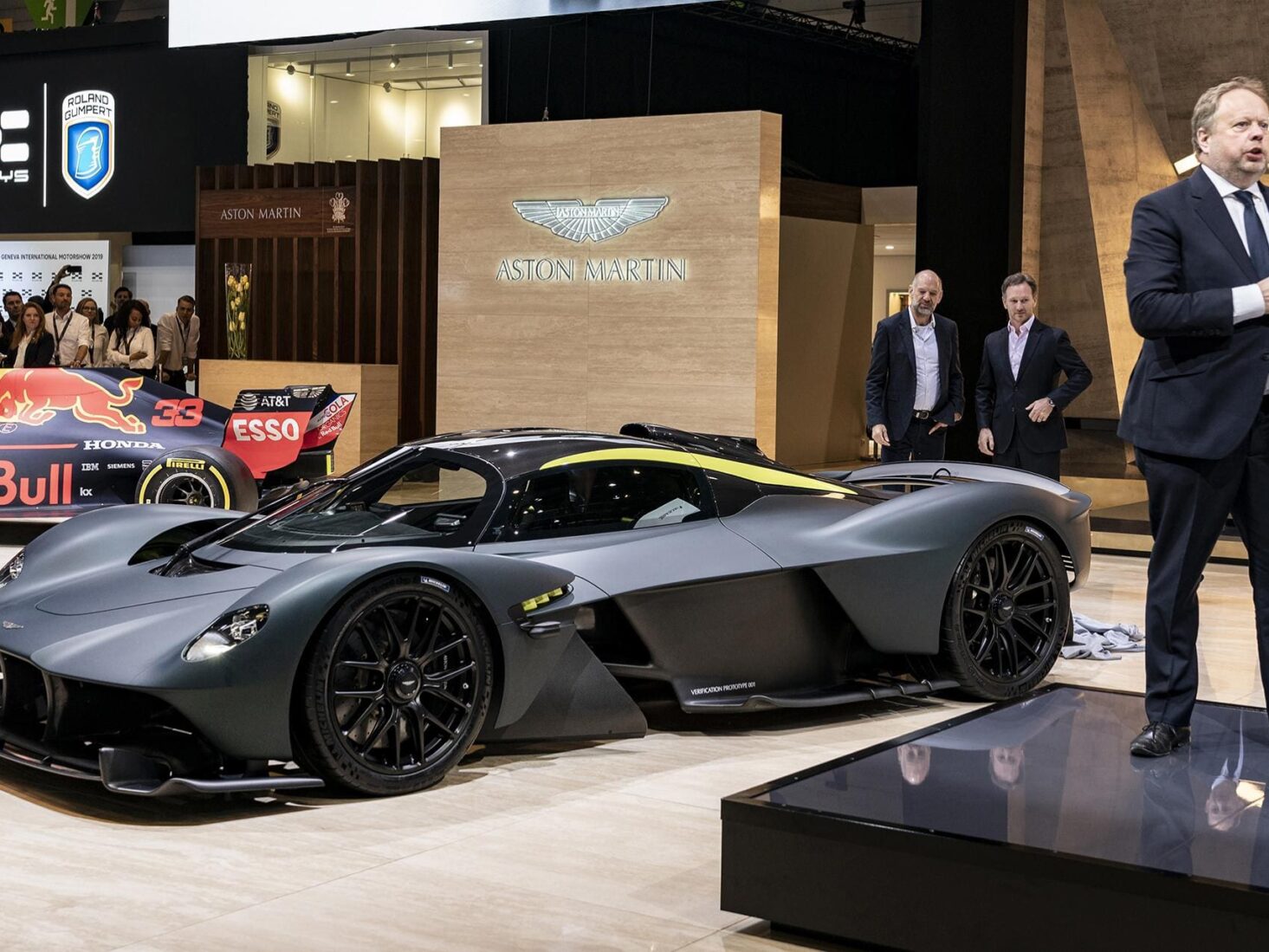
Making His Marque:Aston Martin CEO Andy Palmer
Dubbed the most influential person in the automotive industry, Aston Martin CEO Andy Palmer has breathed new life into the 106-year-old company, making it the world’s fastest-growing car manufacturer. Following the launch of the brand’s first

“I do miss the Japanese food. I really love my food,” says Andy Palmer. But, after 23 years with Renault-Nissan – where he was chief planning officer, number two to the CEO and about as high up the pecking order as he was likely to get – Palmer moved back home from Japan towards the end of 2014. And not just home in the sense of the UK – his move back to join Aston Martin meant working at the company’s headquarters at Gaydon, Warwickshire, where he grew up.
He’d done it all by then, mind – apprenticed at 16, transmissions chief engineer, marketing officer. “I’d done everything in the car industry except finance,” he says, jokingly referring to his decision to leave Nissan as a kind of mid-life crisis – he’d just turned 50 at the time. “The fact is I’d always wanted to be a CEO. I knew I could settle down with what was a fantastic job, or I could live the dream. And there was a feeling that every bit of my training was leading me to this moment.” His lack of experience in finance didn’t, however, stop him joining Aston Martin with the condition that the company received around $1 billion up front from lead shareholders Investindustrial (of Italy) and Tejara Capital (of Kuwait) – one half of the original consortium, led by Prodrive chairman David Richards, which bought Aston Martin from Ford in 2007.

That money wasn’t for himself, of course, but to fulfil the vision his study of the carmaker had inspired. That meant having the equity to give the company fresh momentum to produce four new cars, including a forthcoming SUV. It was something of a gamble, and it’s paying off: last year Aston Martin announced record profits. It was also named not only the world’s fastest growing car brand, but the fastest growing British brand of any kind.
“I’m an arrogant b*****d,” laughs Palmer. “Of course I knew that I would be pilloried by some for suggesting the likes of an SUV should be made by a sports car company [unlike the Formula 1-inspired, most-expensive-ever Aston Valkyrie; or Palmer’s promise that there will always be at least one manual transmission car on offer in the Aston Martin line-up]. But that didn’t bother me. Ultimately, surviving is more important than staying true to an ideal that was relevant 50 or 60 years ago.”
It’s fighting talk – something one imagines Palmer rather enjoys. Indeed, he’s taking a rather radical stance with the company as part of what it calls its Second Century Plan. With the future of hardcore, petrolhead-teasing sports cars in the balance, he sees Aston Martin as becoming more of a luxury lifestyle brand: hence its recent move into designing swanky apartments in Miami, furniture, a bicycle, a speedboat, even a submersible, all complementing a broader range of vehicle types. It’s all well beyond the heartlands of the famed Aston Martin DB line that celebrated its 70th anniversary last year – and which, thanks to James Bond, is many a man’s introduction to the marque.
“We’ve moved from, as it were, having three Russian dolls in one sector of the car market – GTs essentially – to covering a much broader base. There were so many categories of car for which Aston Martin just didn’t have anything. Now we’re going to be less like Jimmy Choo, a specialist, and more like LVMH – a house of brands,” explains Palmer – with, for example, the revival of the Lagonda marque set to give Bentley a run for its money. “And that all opens up opportunities – for licensing, say. You get to cover a broader lifestyle proposition. There’s a danger in this if you’re all about caps and T-shirts – but we’re getting into products that have genuine crossover for our customers. You can buy a multi-million-pound tender from us now. You can even buy a holiday. I just don’t see Aston Martin as just being a car company anymore. And one of the biggest challenges has been getting our heads around that.”

If that sounds a little scary to the motoring purists, Palmer insists that it comes out of both admiration for Aston Martin and out of a desire to see it thrive – not something its history has ever really suggested was possible. As he notes, the company has – for all but two years – never been profitable, in the sense of generating cash, “but I had a strong sense that it should be,” says Palmer. “Study the story of Aston Martin and it’s really one of successive millionaires buying the company, producing one car, and then walking away. I don’t see Aston Martin as ever being anything less than exclusive – I have a deep conviction that the only way you can make money in the car industry is at the very top, or at the very bottom. But the company has never had a discrete range of cars that appealed to different kinds of people, which is what you need.”
That, in essence, is Palmer’s hard-headed vision for the Aston Martin of the 21st century – identifying the variety of needs of the high-net-worth individual (or the varieties of high-net-worth individuals) and providing a car to match. That may sound mechanistic against the romantic spirit of Aston Martin’s heritage, but not for nothing did a Forbes magazine study conclude in 2013 that Palmer was the world’s third most influential marketing officer – after those at Apple and Samsung. Only the coming years will suggest whether his vision is proven right, but Palmer sees no reason why Aston Martin can’t be, as he puts it, “a second Ferrari”. As he notes, it wasn’t that long ago that Aston Martin was selling more cars than the famed Italian maker.
Palmer has, at least, fulfilled one ambition in becoming CEO. “The best thing about the job is the company car,” he says with boyish relish. At the time of writing, he finds himself driving a DB11 – and there’s an enviable garage to choose from. The road ahead is by no means clear, but since his tenure, positive steps have been taken. Aston Martin has (in exchange for a small shareholding) been able to tap into Daimler’s electronic systems capabilities, for example – a crucial step at a time when the car industry is spending billions on just that, seeing it as essential for ensuring longevity. It has come up with some ground-breaking technologies, including the likes of the DB11’s Aeroblade, an ‘invisible’ spoiler. Bonded aluminium and other high-tech material structures have become something of an Aston Martin speciality too, he says, although these may prove useful for the future of the company, again in ways the traditionalists might not approve of: those lightweight, aerodynamic, low-roll resistant structures are perfect for electric cars.

“Again, you can’t ignore the rise of the electric car,” says Palmer. “You have to make choices. That doesn’t mean following trends. But it does mean making certain bets on how the world will change. As it happens the things that electric cars like least are mass and drag – and managing those are something Aston Martin is really good at. That kind of technology is really relevant and really sellable.”All in good time. Palmer agrees that there are certainly still ideas that could be imported to the company culture that would help achieve his aims for it. He speaks of the Japanese emphasis on teamwork and admits that when he joined Aston Martin he was surprised by all the internal politics, having been away from that curiously British style of working for so long. “In Japan, working together comes naturally and intrinsically, maybe because they all know they have jobs for life, but they just think for the betterment of the company, rather than the individual,” he explains.
But what sets Aston Martin apart, he argues, is passion. That may be a cliché, but Palmer sounds genuinely impressed by what he’s found at his new charge. “Really, never with all the car companies I’ve been associated with over the years have I seen anything like it,” he says. “If you’re just doing it for the money, you’d go over the road here at Gaydon and work for Jaguar Land Rover. But there’s a real sense that working at Aston Martin gives you real standing in the industry. Mention at a dinner party that you work for the company and it makes you the centre of conversation. Here you’re exploring the outer reaches of physics, not the outer reaches of accountancy.”
Finance, if you recall, is not a field Palmer has ever worked in. Perhaps that will actually prove to be to Aston Martin’s great benefit. Dig down and Palmer is all about blending the company’s world-class design and engineering capabilities to make what he calls “the most beautiful cars in the world”. It’s as simple – and as complicated – as that.









